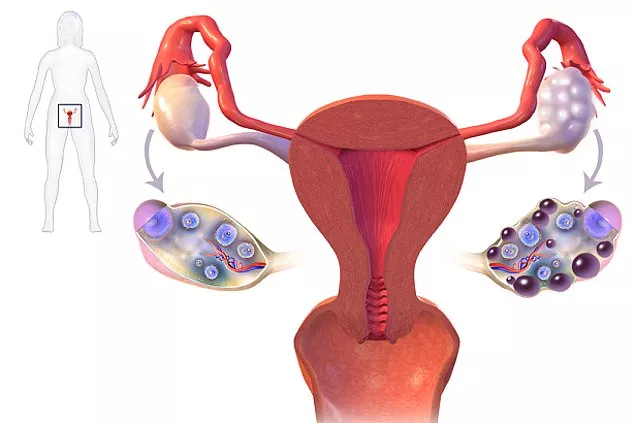The condition in which a large number of small benign cysts form on the ovaries of the woman is called Polycystic Ovary Syndrome. Polycystic Ovary Syndrome, which is usually seen in women under the age of 35, consists of the production of an abnormal amount of Luteinizing Hormone and Follicle Stimulating Hormone secreted from the pituitary gland in the brain. These small cysts, which are arranged in an order like pearls around the ovaries, can prevent the ovaries from performing their normal functions. Polycystic Ovary Syndrome prevents women from ovulating regularly and due to the absence of ovulation, the male hormone increases in the woman’s body. These hormones are also converted into estrogen in fat, which in turn increases Luteinizing Hormone. This vicious circle causes female infertility. Since Polycystic Ovary Syndrome patients cannot ovulate regularly, it is very difficult to achieve pregnancy naturally. Therefore, assisted reproductive treatment methods are performed. In this context, if the most common symptoms of Polycystic Ovary Syndrome are menstrual irregularity, acne, hair growth, weight gain and the inability to achieve pregnancy naturally, it is useful to consult a doctor. However, it is worth noting that; In this patient group, some women have regular menstruation every month, while others can menstruate at most 2-3 times a year. In this context, regular menstruation does not indicate that there is no Polycystic Ovary Syndrome.
Polycystic Ovary Syndrome diagnosis and treatment
In women, menstrual irregularity, abnormal hair growth, acne, hair loss, darkening of skin color, flesh moles, sexual reluctance and fungal infections can be the harbingers of Polycystic Ovary Syndrome. If not one but several of the conditions accepted as the symptoms of Polycystic Ovary Syndrome are observed in the same period, an obstetrician and gynecologist is consulted. Testosterone hormone values in the blood test performed in the health institution will give information about whether the woman has Polycystic Ovary Syndrome. However, the hormone levels of the adrenal glands are also examined and the final diagnosis is made as a result of these two tests. Following the diagnosis of Polycystic Ovary Syndrome, a treatment method is determined according to whether the patient wants to have a child or not.
Polycystic Ovary Syndrome treatment in women who want to have a baby
If the patient with Polycystic Ovary Syndrome wants to have a baby, the treatment method to be chosen is determined according to the age of the woman, the progression of the disease, the condition of the ovaries on the ultrasound image. In addition to the woman’s excess weight, insulin resistance, sugar discomfort, egg development and ovulation problems, other infertility problems caused by the woman or man should be evaluated together. Then, first of all, ovulation-enhancing drugs are used and in this way, ovulation is regulated in approximately 80% of patients with Polycystic Ovary Syndrome. However, getting rid of the extra pounds caused by the discomfort will also help the woman regain her ability to reproduce. Because in order for the woman’s hormones to be secreted at normal levels, her weight must be within normal values. However, in cases where medication and weight loss do not work, drilling is performed to cysts with laparoscopy. With the surgical operation performed in this way, it is possible to get rid of cysts that prevent ovulation.
Risks of Polycystic Ovary Syndrome
The tissue of the inner wall of the uterus thickens during the ovulation period under the influence of hormones secreted in the ovaries, preparing itself for a possible pregnancy. However, if pregnancy does not occur, hormone secretions decrease and the inner wall of the uterus becomes thinner. This process is a result of natural functioning. In patients with Polycystic Ovary Syndrome, hormone secretions are irregular and ovulation does not occur regularly. For this reason, the inner tissue of the uterus cannot follow the stages it should be. Conditions such as overweight and increased insulin resistance brought about by Polycystic Ovary Syndrome also increase the risk of developing uterine wall cancer. However, the risks of diabetes, high blood pressure, heart disease, weight gain, stroke and low pregnancy occur with Polycystic Ovary Syndrome.
You can contact our clinic for detailed information.


